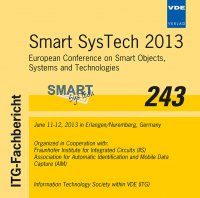The Effect of the Flows of Information on Residential Electricity Consumption: Feasibility Study of Smart Metering Pilot in Latvia
Conference: Smart SysTech 2013 - European Conference on Smart Objects, Systems and Technologies
06/11/2013 - 06/12/2013 at Erlangen/Nuremberg, Germany
Proceedings: Smart SysTech 2013
Pages: 9Language: englishTyp: PDF
Personal VDE Members are entitled to a 10% discount on this title
Authors:
Laicane, Ilze; Blumberga, Andra; Rosa, Marika; Blumberga, Dagnija (Riga Technical University, Faculty of Power and Electrical Engineering, Institute of Energy Systems and Environment, Kronvalda boulevard 1, LV-1010, Riga, Latvia)
Bariss, Uldis (The public limited company Latvenergo AS, Pulkveza Brieza iela 12, Riga, LV-1230, Latvia)
Abstract:
The aim of this research is to describe options and solutions for the effective communication and cooperation engaging stakeholder in the smart metering pilot in Latvia (i.e. electricity consumers, electricity suppliers, smart meter suppliers and scientific research institutions) using a variety information resources (such as detailed electricity bills, e-mails, mobile applications, web portal, informative workshops, open days, e-journals, information sheets, brochures, discussion clubs, videos, etc.). This communication in terms of each stakeholder can be defined as the system through which qualitative information is created and provided in accessible formats, communications forms, are disseminated to the public and preserved for future use. In this research emphasis is being placed on Web-based stakeholder communication. This pilot is the first attempt to promote broader household involvement in energy efficiency measures using smart technologies aimed at encouraging consumers to reduce energy consumption. Provision of information is the „keyword” of this pilot to strive for a very high added value – to develop the concept of innovative and creative awareness-raising smart systems use aiming at raising electricity end-user awareness of energy efficiency and green thinking. This is what we want to contribute in this Project. Furthermore, it will contribute to higher scientific, social and economical added value. Latvia is currently on the initial stage of smart metering implementation in households. In this context, related bahavioural studies will contribute to the development of appropriate energy efficiency measures in households that are highly important for Latvia. It can serve as a further contribution to policy makers for determining a legal framework for smart metering implementation in Latvia in the next few years. Keywords — Smart metering, Smart meters, Metering infrastructure, Communication technologies, electricticity consumption, energy efficiency, household


